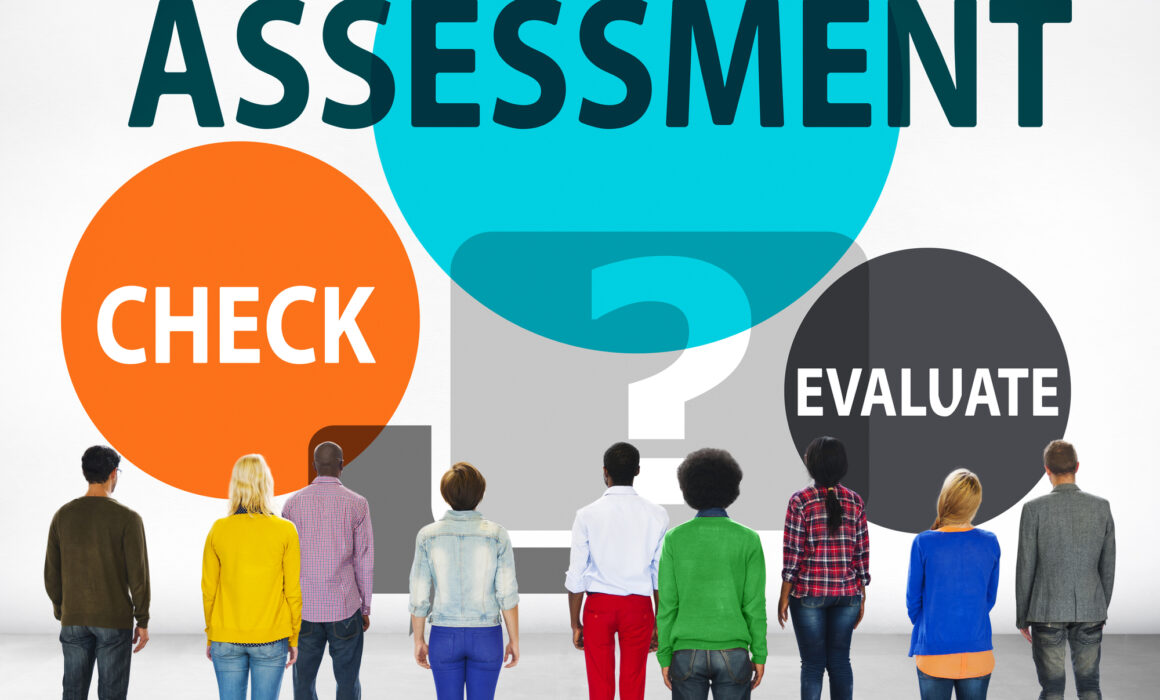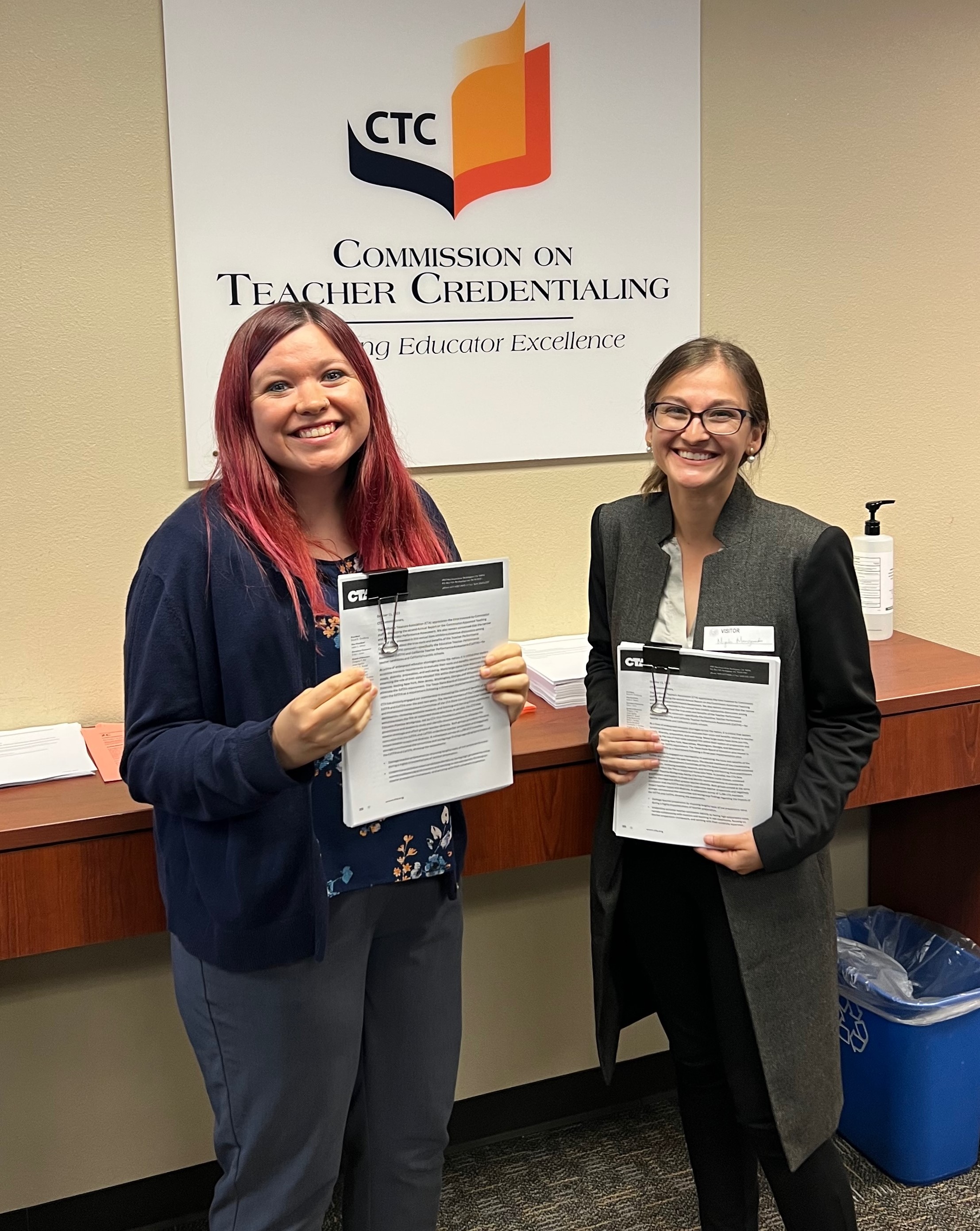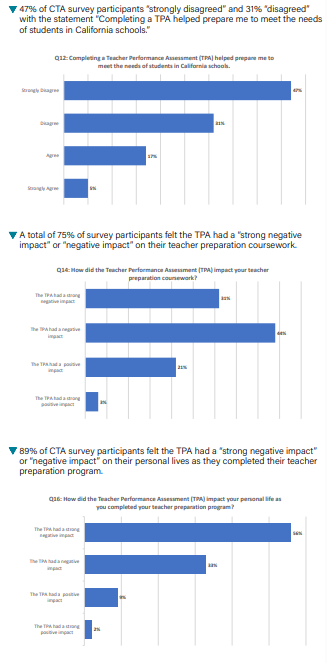
SINCE 2008, California’s Commission on Teacher Credentialing (CTC) has required teacher candidates to pass a teaching performance assessment with K–12 public school students as a mandatory step toward earning a preliminary teaching credential.
The teaching performance assessment — CalTPA and EdTPA are the two models* — is designed to measure the candidate’s knowledge, skills and ability to instruct Pre-K–12 students in the Student Academic Content Standards. This includes subject-specific pedagogy, designing and implementing instruction and student assessment, video-recording teaching, and reflecting on practice.
A recent CTA survey found that new educators overwhelmingly think the TPA does little to help prepare them to teach and in fact is redundant, stressful, time-consuming and often detrimental to physical and mental health. CTA also noted that because BIPOC teacher candidates have lower success rates on TPAs they may not pursue teaching as a career, which leads to educator ranks that do not reflect the diversity of California’s students.
For the past two years, CTA has been actively involved in evaluating TPA impacts, particularly relative to teacher supply, diversity, preparation and well-being. After extensive research and review, both CTA’s New Educator Pipeline Workgroup (NEPW) and Credentialing and Professional Development Committee of CTA State Council concluded that TPAs undermine teacher preparation and negatively impact teacher supply and diversity.
The findings are corroborated by the survey of 1,284 CTA members with 10 or fewer years of teaching. Some 60% of respondents “strongly agree” and 21% “agree” that the TPA should be eliminated outright.
The NEPW recommended that the TPA be eliminated as a requirement for teacher candidates and that performance-based assessment instead take place within teacher preparation coursework or practice.
“Judges candidates unfairly”
“CTA absolutely supports high standards for teaching and accountability,” said CTA Vice President Leslie Littman, who led the NEPW. “But the work group concluded that while there might have been good intentions with the TPA, it was always an additional burden and requirement for teacher candidates that was unnecessary,
“Just like how standardized testing doesn’t benefit our students, the TPA doesn’t benefit candidates and judges them unfairly.”
States that have already eliminated the TPA include Georgia, New Jersey, New York, Washington and Wisconsin. The Texas State Board of Education also moved to reject the EdTPA as a requirement following a three-year implementation pilot.
Most teacher candidates work on the TPA while completing coursework, other exams and other requirements for certification. The survey revealed that respondents found great value in the coursework and especially in their work with teacher mentors. They found little if any value to the TPA and saw it as an enormously difficult addition to their workload during an already challenging time.
Controversy about the TPA — and its impact on BIPOC teacher candidates — is not new. The California Alliance of Researchers for Equity in Education asked the CTC in 2021 to end high stakes standardized testing in teacher education, saying in a letter that problems with teacher credentialing exams include “validity, reliability, fairness, and bias.” In a 2019 research brief, the alliance had recommended that California eliminate the TPA “from all high-stakes decision making.”
Embedding assessment in clinical practice
Surveying and talking to union members, along with setting up structures to study the TPA issue, has positioned CTA leaders and educators to take action. At this year’s October 12–13 meeting of the CTC, CTA distributed its survey results along with recommendations for TPA revision. They include:
• The onus for passing the TPA must transfer from the candidate to the teacher preparation program, as specified by law;
• The assessment should be embedded in teacher candidates’ clinical practice as part of the broader assessment;
• Candidates should not have to take the TPA more than once;
• The accreditation process, including the TPA, should ensure that candidates are supported.
At the CTC meeting, Commissioner Christopher Davis spoke on standardized testing’s impact on BIPOC candidates. Standardized testing, he said, causes “disproportionate harm” to people of color. “We continue to struggle with the reality that our state, through these examinations, is systematically discriminating against the very diversity it alleges it wants to track into our workforce.”
CTC commissioners requested additional data to better understand TPA’s impact on BIPOC teacher candidates.
If the CTC does not act in a timely manner, CTA is prepared to move forward. At the October 22–23 CTA State Council, delegates approved of a sponsored legislation proposal to eliminate the TPA requirement for teacher candidates in California. The process is expected to take several months, and the Educator will continue to cover this story.
*There is also the Fresno Assessment of Student Teaching (FAST), serving students that attend Fresno State University for their teacher education.
The TPA Takes Away Time and Focus
WHEN JAZELLE JOHNSTON ENROLLED in her credential course in 2022, she was told that she shouldn’t have a job because the coursework, clinical practice and TPA requirements
would take all her time.

Jazelle Johnston, pictured here in her classroom, says “the TPA is worded in such a way that it’s unapproachable.”
“During my first semester I didn’t work, but then during the second semester I had to get a job,” recalls Johnston, a member of Campbell High School Teachers Association. “I was
substitute teaching, coaching a softball team and working at a café on weekends.”
“The assessment is very biased. The CalTPA is superscripted and you have to follow ‘rules’ that are ambiguous and unspoken.”
—Jazelle Johnston, Campbell High School Teachers Association
Her workload became untenable. “I would do my TPA videos, then I would have to edit videos or write up the nine pages that go along with them at 11 p.m. at night. I’d be unconscious on my keyboard at 11:15, then wake up to be on campus student teaching by 7:30.”
Johnston feels that her stressful schedule “100%” affected her ability to pass the TPA, which she did this past June after two attempts. She also felt “the assessment is very biased. There is a prescribed way the CalTPA is set up — it’s super-scripted and you have to follow ‘rules’ that are ambiguous and unspoken.
“I’m an English teacher and context is everything — the TPA is worded in such a way that it’s unapproachable. And the TPEs (Teaching Performance Expectations) are vaguely worded. You have to read it seven times over and try to figure out what you’re supposed to show as evidence.”
Johnston, 28, adds that the TPA is “really outdated. Instead of rote memorization we are now about student engagement and getting them on track.” She favors eliminating it, a sentiment shared by fifth-grade teacher Erin Githens, a member of La Habra Education Association, and second-grade teacher Miyuki Manzanedo, a member of Davis Teachers Association.

Erin Githens and Miyuki Manzanedo pass out CTA survey results at the October meeting of the Commission on Teacher Credentialing.
Githens started the CalTPA in 2018 after she had completed her credential program. “It’s difficult because once you complete your credential program there is no support for the TPA,” she says. “I had to seek support from other teachers.”
She found the TPA redundant. “It gives you tasks to assess the quality of your teaching, but that’s what a credential program does — [the latter] already gives you assignments and assessments and observes you in the classroom. The TPA takes away time and focus from this.”
Manzanedo says the TPA distracted from more valuable teacher prep activities, taking time away “from preparing to student teach, from your time in your classroom, your time observing teachers, completing assignments and learning content standards. Instead of coursework you’re working on the TPA’s very high-stakes assignments.”
She recalls having to make “life choices.” “My TPA class ended at 7 p.m. so I would get home between 8:30 and 9. I had to decide whether to do homework or eat dinner or go to bed.”
Manzanedo was a “COVID candidate,” unable to complete the TPA due to the pandemic. Gov. Gavin Newsom granted these candidates a preliminary credential to help with the teacher shortage, and Manzanedo’s first year of teaching was online. In July 2023, Newsom signed off on SB 114, which exempted the candidates from having to pass the TPA if they had participated in an induction program or had been teaching for two years.
Both Manzanedo and Githens say they did not experience hardship while working on the TPA, but they saw others who did. “I had way more privileges than my BIPOC peers,” Githens says. “I noticed my BIPOC peers were taking on more, many were caregivers, had outside jobs, and some even had housing and food insecurity. Historically school is not designed for them or those seeking second careers.”
Manzanedo feels that BIPOC educators did not get the additional help they needed. “[The TPA program] assumed they knew what candidates need to succeed. They did not reach out to BIPOC educators, they did not ask candidates ‘what do you need in this moment.'”
Comments from a 2023 CTA survey of 1,284 members with 10 or fewer years of teaching:
“[The TPA] caused so much
additional stress and anxiety
that I had to reconsider
whether I truly wanted to
pursue this profession. It drove
away my passion for education.
I eventually sought mental
health care.”“I don’t feel that I learned
anything from the process, and
instead was working to just
show my ability to regurgitate
academic language and label
processes.”“It made me hate myself and
think I wasn’t a good teacher.”“As a student, I was never good at
tests and for this to be what was to
determine if I was a good teacher
(passing) or a bad teacher (failing)
was a lot of added stress. I did not
want to fail myself or my family since I
am a first-generation student.”“It felt that I was just expected to just
give Pearson another $200 check for
them to fail me.”“I failed 3 times. I knew I was a great
teacher, passing all evaluations,
recommended to mentor other
teachers who passed the TPAs. But
you have to play the TPA game and
write [to] the liking of your grader.”“Failing this test literally sent me into a
depressive episode. I quit a lucrative
career to teach and I was absolutely
devastated by the results of my test.
Today I am a competent, loved,
respected teacher by kids and staff
and in no way did the TPA help me
with that.”
CTA surveyed 1,284 members with 10 or fewer years of teaching about requirements for their credential, including the TPA. Highlights from survey results:

Pullquotes used in this story are excerpted from the CTA survey of 1,284 CTA members with 10 or fewer years teaching.
I find the edTPAs pointless. We have a program in which we have to record our selves, evaluate our selves, our students, write immense lesson plans…etc. Why do we have to do the edTPAs if we are already being evaluated throughout the program? A Credential program should not be required if we will have to go through the same thing again. I am so stress already with my job and my program that I am even losing my hair. If I would know all of the things that I would have to go through I would NEVER have chosen this path.
I just got my edTPA results and I scored a. 40……. I failed by 1 point. It took so much to complete my tasks and teach all my students. My admin has evaluated me 4 times over the past two school years and I’ve done wonderful. I know I’m a great P.E. teacher, but the edTPA says otherwise. It makes me not want to teach.
I’m currently struggling with the TPA and it has made me feel worse at my job than when I started. After failing it twice, it’s made me reconsidered staying in California. I love teaching, but this state clearly doesn’t want or need me. It wants me to teach to a script, lets me write the script, tells me I’m wrong and provides no support in what performance it wants to see. I’m not the kind of person that can keep to a script and that’s what the TPA demands and that’s not who I am.